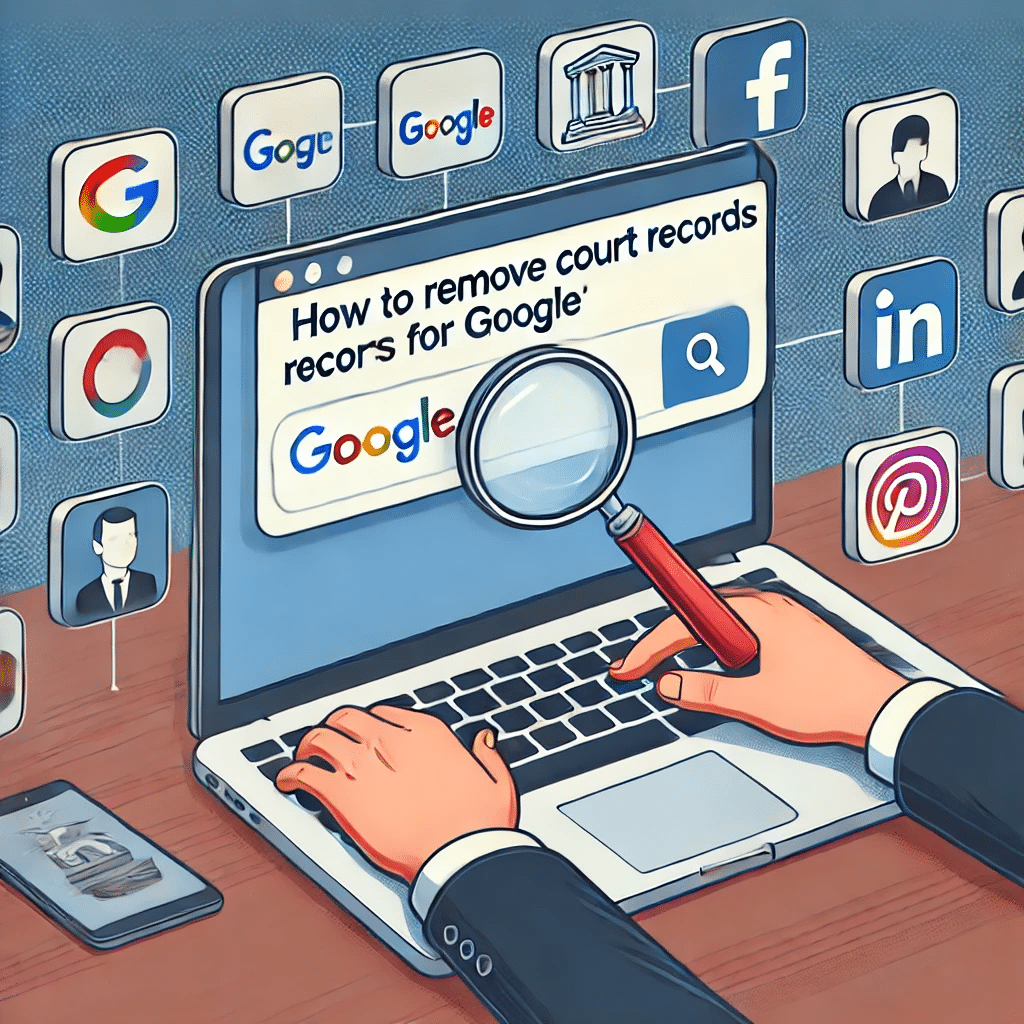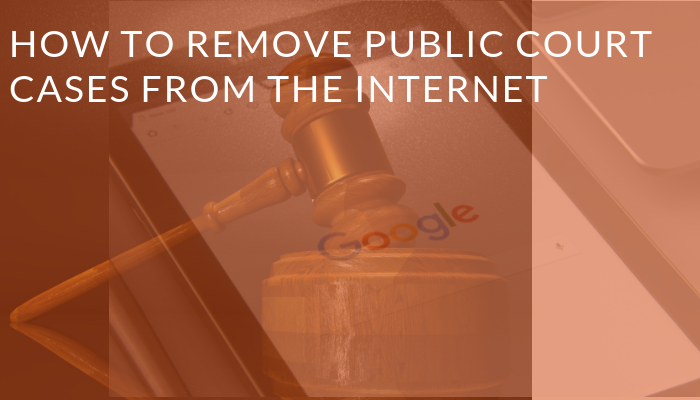How to Remove Court Records from Google and the Internet
In today’s digital age, privacy concerns are at an all-time high, especially when it comes to personal and sensitive information like court records. Whether you’re an individual or a business, having court records available on the internet can severely tarnish your reputation. Fortunately, there are several strategies you can employ to remove court records from Google and other search engines. In this comprehensive guide, we’ll walk you through the steps to effectively remove or suppress unwanted court records online.
Removing Court Records from the Internet
Understanding the Impact of Online Court Records
Court records, whether related to criminal cases, civil disputes, or any legal matters, are typically considered public records. This means they can be accessed by anyone, including potential employers, business partners, and even personal acquaintances. When these records appear in Google search results, they can have several negative impacts:
- Employment Issues: Many employers conduct online background checks. Finding court records can result in job rejections.
- Business Reputation: For businesses, court records can deter potential clients and partners, affecting the bottom line.
- Personal Relationships: Personal relationships can also suffer if court records are easily accessible online.
- Mental Health: Constant worry about who might see these records can take a toll on your mental health.
Given these potential impacts, it’s crucial to take steps to manage and mitigate the presence of court records online.
Step-by-Step Guide to Remove Court Records from Google
1. Identify the Source of the Court Records
The first step in removing court records from Google is identifying where these records are hosted. Court records can be found on various types of websites:
- Official Court Websites: Many courts publish records online.
- Legal Research Websites: Sites like CourtListener LexisNexis, Trellis.Law, PacerMonitor and others provide access to court records.
- News Websites: News articles about court cases can also appear in search results. Learn how we can help remove news articles from the internet.
- Public Records Websites: Websites that aggregate public records, such as people search sites.
2. Contact the Website Hosting the Records
Once you’ve identified where the court records are hosted, the next step is to contact the website. Here’s how you can approach different types of websites:

Official Court Websites
Contact the court’s administrative office or webmaster and request the removal of the records. Provide any necessary documentation, such as court orders or expungement certificates, to support your request.
Legal Research Websites
Reach out to the customer service or support team of the legal research website. Explain your situation and request the removal or de-indexing of the records from search engines.
News Websites
If a news website has published an article about your court case, contact the editor or webmaster. Politely request them to remove or update the article to reflect the current status of your case.
Public Records Websites
For public records websites, find their contact information and submit a formal request for removal. Some of these sites may have specific forms for removal requests.
3. Request De-Indexing from Google
If the website hosting the court records refuses to remove them, the next step is to request Google to de-index the pages. Here’s how to do it:
- Remove URLs from Google Search: Use Google’s URL removal tool to submit a request for removing specific URLs from search results. Provide a valid reason for the removal request.
- Report Outdated Content: If the content is no longer relevant or accurate, use Google’s Outdated Content Removal tool to request its removal from search results.
- Use the Right to Be Forgotten: In some jurisdictions, such as the European Union, individuals have the “Right to Be Forgotten”. You can submit a request under this law to remove your personal information from search engines.
4. Suppress Negative Search Results
If removing court records from the source or de-indexing them from Google is not possible, the next best option is to suppress negative search results. This involves creating and promoting positive content that pushes the negative results down in search engine rankings. Here’s how you can do it:
Create High-Quality Content
Create blogs, articles, press releases, and other forms of content that highlight your positive achievements, skills, and attributes. Use the same keywords that bring up the negative records to optimize this content. (Explore our Reputation Management Services)
Leverage Social Media
Set up and actively maintain profiles on major social media platforms like LinkedIn, Twitter, Facebook, and Instagram. Regularly post positive updates and engage with your audience.
Build Personal or Business Websites
Create personal or business websites that contain positive and relevant content about you or your business. Ensure these websites are optimized for search engines to improve their ranking. (Learn more about Online Reputation Repair)
Utilize Online Directories and Profiles
Submit your personal or business information to reputable online directories and professional profiles. This helps in creating positive associations with your name or brand.
Engage in Online Communities
Participate in online forums, Q&A sites like Quora, and other online communities related to your field. Share valuable insights and build a positive online presence.
5. Legal Recourse
In some cases, you may need to take legal action to remove court records from the internet. Here are some legal avenues you can explore:
Expungement or Sealing of Records
If your court records are eligible, you can file for expungement or sealing of records. Once the records are expunged or sealed, you can request their removal from online sources.
Cease and Desist Letters
Send a cease and desist letter to websites hosting your court records, especially if they are violating your privacy rights, or engaging in copyright infringement or defamation. Learn more about sending a cease and desist to get website content removed.
Lawsuits
As a last resort, consider filing a lawsuit against the website or entity that is refusing to remove the court records. Consult with a legal expert to understand your options.

6. Hire a Reputation Management Company
Managing your online reputation and removing court records can be a complex and time-consuming process. Hiring a professional reputation management company, like Defamation Defenders, can be a worthwhile investment. Here’s how we can help:
Comprehensive Removal Services
We provide comprehensive services to remove court records from the internet, including contacting websites, filing de-indexing requests, and suppressing negative results. Find out about our proven solutions to remove negative information from the internet.
Expertise and Experience
With years of experience in reputation management, we have the expertise to handle even the most challenging cases. Our team is well-versed in legal and technical aspects of online reputation management.
Customized Strategies
We develop customized strategies tailored to your specific needs and goals. Whether you’re an individual or a business, we have the tools and resources to restore your online reputation.
Ongoing Monitoring and Maintenance
We offer ongoing monitoring and maintenance services to ensure your online reputation remains positive. We continuously monitor the web for any new negative content and take swift action to address it.
Conclusion
Having court records available on the internet can be damaging to both individuals and businesses. However, by following the steps outlined in this guide, you can effectively remove or suppress these records from search engines like Google. Whether you choose to handle the process yourself or hire a professional reputation management company, taking action is crucial to protect your privacy and reputation.
If you need expert assistance in removing court records from Google and the internet, contact Defamation Defenders today. Our experienced team is ready to help you restore your online reputation and ensure that you present the best possible image online.
FAQs on Removing Court Records
Q1: Can I completely remove court records from the internet? A: While it is challenging to completely remove court records from the internet, you can take steps to de-index them from search engines and suppress them with positive content.
Q2: How long does it take to remove court records from Google? A: The timeline varies depending on the complexity of the case and the cooperation of the websites hosting the records. It can take anywhere from a few weeks to several months.
Q3: What is the “Right to Be Forgotten”? A: The “Right to Be Forgotten” is a legal provision in some jurisdictions, such as the European Union, that allows individuals to request the removal of personal information from search engines.
Q4: Can reputation management companies guarantee the removal of court records? A: While reputable reputation management companies can significantly increase the chances of removing or suppressing court records, they cannot guarantee complete removal in all cases.
Q5: How much does it cost to hire a reputation management company? A: The cost varies depending on the scope of the services and the complexity of the case. It’s best to contact reputation management companies for a personalized quote.
Q6: What are the risks of not addressing online court records? A: Not addressing online court records can result in significant personal and professional repercussions, including job rejections, loss of business opportunities, and damage to personal relationships.
Q7: Can positive content really suppress negative search results? A: Yes, creating and promoting high-quality positive content can effectively push down negative search results, making them less visible to the public.
If you need more information or assistance, don’t hesitate to contact Defamation Defenders.



